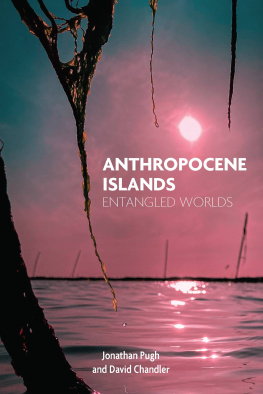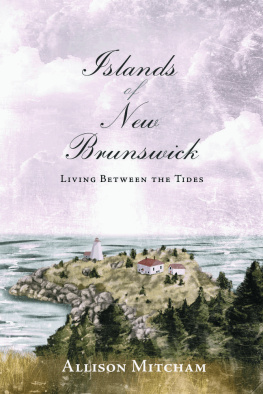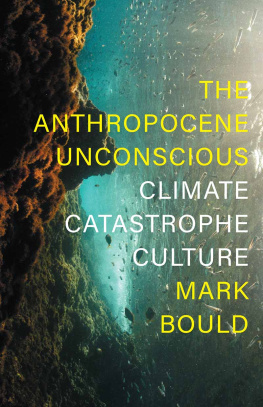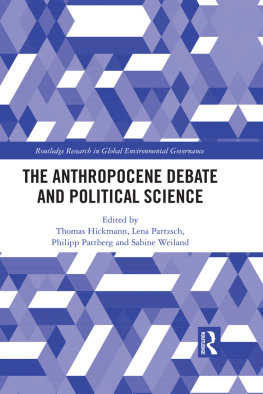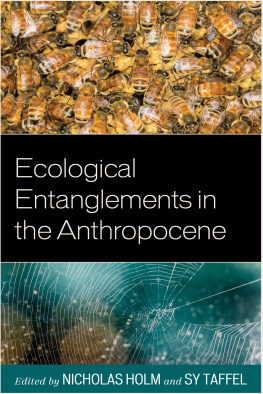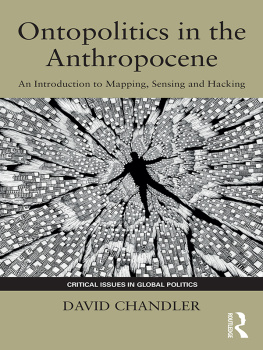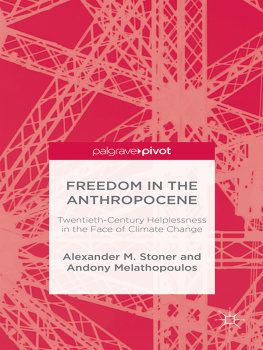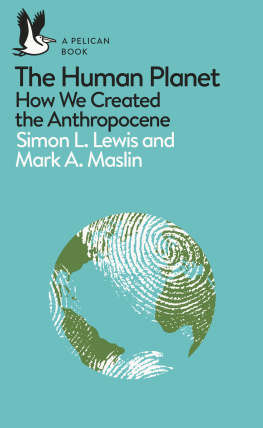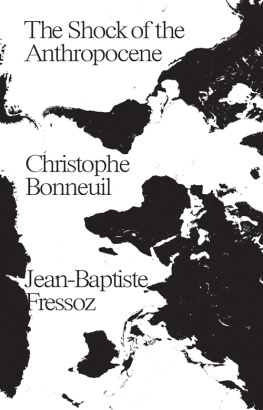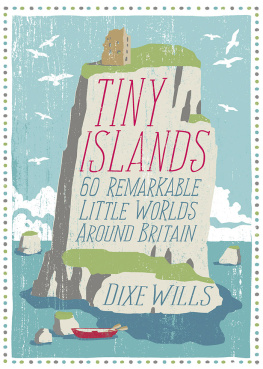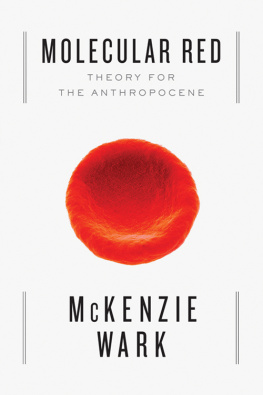Contents
Anthropocene Islands
Entangled Worlds
Jonathan Pugh and David Chandler
A must read In this long-awaited book, [Pugh and Chandler] open up a new analytical agenda for the Anthropocene, coherently drawing out the power of thinking with islands.
Elena Burgos Martinez, Leiden University
This is an essential book. By thinking with islands, Pugh and Chandler articulate new ontologies and epistemologies to help us understand the relational entanglements of the Anthropocene. The four analytics they proposeResilience, Patchworks, Correlation, and Storiationoffer both a critical agenda for island studies and compass points through which to navigate the haunting past, troubling present, and precarious future.
Craig Santos Perez, University of Hawaii, Manoa
All academic books should be like this: hard to put down. Informative, careful, sometimes devasting, yet absolutely necessary if you read one book about the Anthropocene let it be this. You will never think of islands in the same way again.
Kimberley Peters, University of Oldenburg
Makes the compelling case that islands have never been merely geocultural objects of study, but rather, generative conceptual objects [for understanding and engaging] the wider, planetary, relational matrix within which the conditions of the Anthropocene era were created.
Michelle Stephens, Rutgers University
What if we were to start not with the great drama of the worlds falling apart, but with a myriad of smaller stories of its coming together? a unique journey into the Anthropocene. Critical, generous and compelling.
Nigel Clark, Lancaster University
Replete with aha! and huh! moments, this book offers insights for all of us who may not have recognised the value of thinking with islands more purposively.
Lauren Rickards, RMIT University
a must-read elucidates novel understandings of islands not only as patches of intensified Anthropocene proliferation, but as sites to examine the intricate relationships between life, matter, and meaning in a changing world.
Adam Searle, University of Cambridge
Anthropocene Islands establishes Pugh and Chandler as two critical and agenda-setting thinkers within island scholarship ... [It] cogently argues that islands have become emblematic figures of the Anthropocene and are moreover influencing the manner in which Anthropocene thinking is developing. a timely and essential contribution
Adam Grydehj, Editor-in-Chief, Island Studies Journal
Anthropocene Islands
Entangled Worlds
Jonathan Pugh and David Chandler

University of Westminster Press
www.uwestminsterpress.co.uk
Published by
University of Westminster Press
101 Cavendish Street
London W1W 6UW
www.uwestminsterpress.co.uk
Text Jonathan Pugh and David Chandler
First published 2021
Cover image: Oliver Chandler
Print and digital versions typeset by Siliconchips Services Ltd.
ISBN (PDF): 978-1-914386-01-5
ISBN (EPUB): 978-1-914386-02-2
ISBN (Kindle): 978-1-914386-03-9
ISBN (Paperback): 978-1-914386-00-8
DOI: https://doi.org/10.16997/book52
This work is licensed under the Creative Commons Attribution-NonCommercial-NoDerivatives 4.0 International License. To view a copy of this license, visit http://creativecommons.org/licenses/by-nc-nd/4.0/ or send a letter to Creative Commons, 444 Castro Street, Suite 900, Mountain View, California, 94041, USA. This license allows for copying and distributing the work, providing author attribution is clearly stated, that you are not using the material for commercial purposes, and that modified versions are not distributed.
The full text of this book has been peer-reviewed to ensure high academic standards. For full review policies, see: http://www.uwestminsterpress.co.uk/site/publish/
Suggested citation: Pugh, J. and Chandler, D. 2021.
Anthropocene Islands: Entangled Worlds .
London: University of Westminster Press.
DOI: https://doi.org/10.16997/book52 . License: CC-BY-NC-ND 4.0
To read the free, open access version of this book online, visit https://www.uwestminsterpress.co.uk/site/books/10.16997/book52 or scan this QR code with your mobile device:

Shall we make island a verb?
(Teresia Teaiwa, 2007: 514)
Contents
Preface and Acknowledgements
Preface
The island has a new found prominence and has become one of the most recognised geographical forms of the Anthropocene. It is a powerful symbol of such forces as global warming, rising sea levels, the fallouts of nuclear proliferation, ocean acidification, the waste of consumerism, ongoing colonialisms, changing ecologies and evolutionary pathways, disruptive weather patterns, including intensified hurricanes and cyclones, and much more besides. But the key argument of this book is that not only does contemporary scholarship and associated practice regularly write about islands, they draw upon and think with islands as key sites for working through todays overarching problematic of relational entanglements, awareness and feedbacks. Our claim is that islands and islanders appear so often and in so many different ways in the development of relational thought associated with Anthropocene approaches, as to make the questions why? and how? worthy of more focused attention. Islands not only appear in the works of scholars of islands, policymaking, activism or artistic practices explicitly directed at islands or islandness, they also increasingly appear, implicitly or apparently in the background, as sites or locations in broader Anthropocene research. Anthropocene Islands articulates why it matters that work seeks to bring island characteristics or what we might call the generative force of islandness to the forefront for thinking through the Anthropocene.
This book schematically draws out why and how contemporary thinking engages and works with islands. Our key argument is as follows: The human/nature divide of modernity is today frequently argued to have collapsed and work on the Anthropocene intensively focuses upon the new problematic of how humans are relationally entangled with the more-than-human forces of transformative planetary changes. Debates about the Anthropocene are characterised by this central and overriding interest in relational entanglements, interactions and feedbacks (Colebrook and Weinstein, 2017; Colebrook, 2019; Giraud, 2019). It is therefore unsurprising that scholars, artists, poets, activists, policymakers and practitioners would want to engage particular geographical forms which exemplify these new stakes. Anthropocene Islands: Entangled Worlds analyses the powerful pull of islands as a figure for thought. They are a key figure for work on the Anthropocene precisely because islands are widely understood to be generative and productive for the core concerns of contemporary thinking.
This is of course not to deny the importance of other forms which are also being widely engaged in Anthropocene thinking. Rather, it is to foreground that thinking and working with islands has enabled Anthropocene thinking to cohere and be applied well beyond its originary fields as more and more physical and geographic entities, from the microbiome of the human gut to oceans and rainforests, are similarly explored as relational systems. Work with islands has emerged as particularly important for the key problematics of Anthropocene thinking. However, to date, no book has analysed why and how broader Anthropocene thinking works with islands for the development of relational ways of being (ontology) and knowing (epistemology). This book seeks to begin to fill this gap in the literature.

